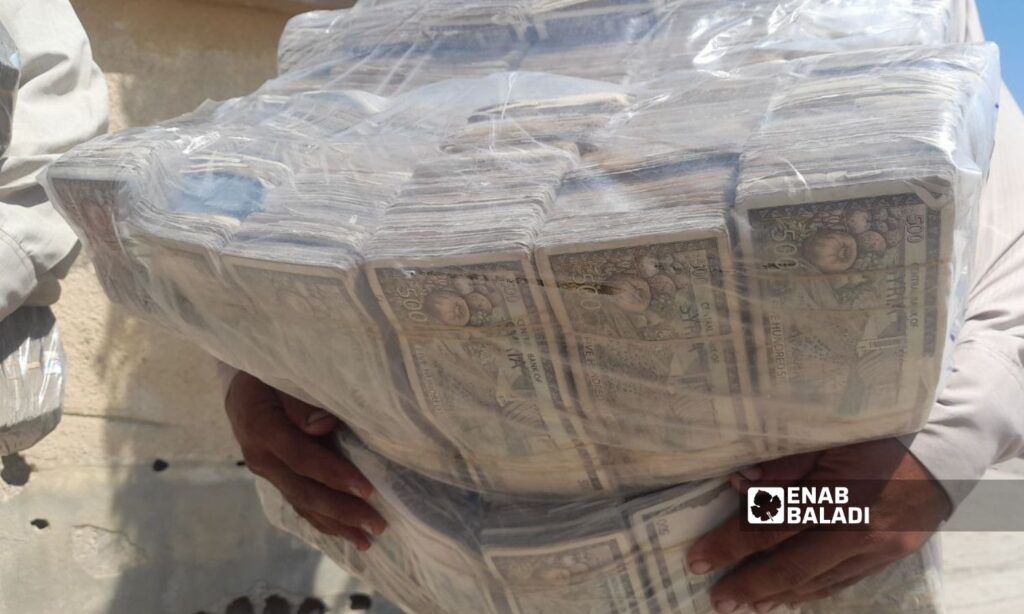Raqqa – Hussam al-Omar
Uday Suleiman, 36, a resident of Raqqa, refused the commission requested by the exchange office for the conversion of 30 million Syrian pounds into US dollars.
Suleiman said that the teller deducted 3% of his money because the amount was in the old 500-pound denomination. He wanted to convert the money into foreign currency so that he could buy a car for 7000 USD.
Currency dealers and money changers in Raqqa, which is held by the Autonomous Administration of North and East Syria (AANES), deduct a proportion of the value of Syrian cash during trading on the pretext of damage and the likelihood of being torn apart when dealing with it.
Traders avoid losses
Kamel al-Abdullah, 42, owner of a money exchange shop on al-Mansour Street in the center of Raqqa, justified to Enab Baladi that currency dealers resort to deducting commissions from their customers’ money for the loss they incur when exchanging or circulating old currencies.
Al-Abdullah noted that the lack of a central bank in Raqqa and the difficulty of replacing damaged banknotes from banks in regime-held areas had resulted in the accumulation of large sums of old banknotes that quickly become damaged or lose parts of their value, particularly when the edges of the banknotes (where the serial number is located) are worn out.
The currency dealer explained that denominations such as 100 or 50 SYP have completely disappeared from circulation in Raqqa, while the 200 SYP denomination survived thanks to its frequent use in internal transportation.
Al-Mansour Street is one of the areas teeming with money exchange and transfer shops in Raqqa, in addition to other shops located in the vicinity of al-Dalla Roundabout, Tal Abyad Street, and al-Amassi Street.
In light of the absence of banks, currency dealers and money changers store their cash in their homes or shops and avoid acquiring old-issue 1000 and 500 Syrian pounds denominations, one of the traders had told Enab Baladi. The trader explained that the main source of old currency is sales of wheat, cotton, and maize delivered to the AANES-affiliated Agricultural Society Development Company.
Law incapable of preventing abuses
A member of the Economic Committee of the Raqqa Civil Council told Enab Baladi that AANES had passed a law prohibiting discounting currencies on the pretext of damage or unclean banknotes but that most traders did not abide by it.
The committee member warned the residents of Raqqa and other areas of northeastern Syria that they should not accept deduction from their money and called on them to submit complaints to the Directorate of Supply and Chambers of Commerce if this occurred under any pretext.
At the end of May 2021, the AANES’ Finance Commission issued a circular requiring cashiers and remittance companies to deliver the same amounts in incoming remittances and not to deduct any percentage under the pretext of unclean banknotes.
The circular quoted by the local North Press Agency prevented remittance and exchange companies from changing currency unless requested by the customer and at the hourly exchange rate.
AANES grants a margin of freedom in monetary and financial transactions in the areas it manages in northeastern Syria. The Chamber of Commerce and the Finance Commission regulate the affairs of remittance and exchange offices and companies.

